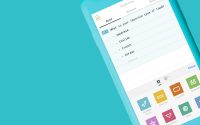Mobile App Checklist for New Developers
This article outlines a contribution for an Edtech Handbook, summarizing some areas we cover at Moms With Apps. Basically, what are key points to consider before making an app? I’ve assembled the top ten that come to mind. As I refine the content for the handbook, I invite your perspectives and comments to round out the discussion.
Search
Once you have an app idea, try searching for other apps like it. What keywords did you use for the search? Did you find similar apps? What categories were they in? How is your app going to be different? Putting the “app idea” in context of what already exists helps determine the competition and the user’s most likely path to discovery.
Design
Look, feel, and user interface all make a difference in how the app is received. A professional edge will help an app stand out in the crowd. The springboard icon (little square image with rounded corners on the iPhone/iPad display) is a first impression and should be designed to capture the user’s attention and convey quality.
Social Media
Is your brand a series of apps, or a single app? Some developers set up a new Facebook page for every app. Before they know it, multiple Facebook pages are cannibalizing one another. A social media presence should build, and not fragment, a brand. Elements of the social media portfolio include a blog, Facebook page, Twitter account, YouTube channel (for app trailers), Google +, and Pinterest.
Blogger Outreach
Coverage from an influential blogger can produce substantial results. Unfortunately, many bloggers are overwhelmed with app review requests. Target bloggers in advance of your launch, and get to know them by reading, sharing and commenting on their blogs and Facebook pages. The more they “see” you in advance, the more likely they’ll notice your app review request.
Teacher Previews
Teachers need to assess whether an educational app is right for their classroom before buying in bulk, so the ability to preview an app before purchase is valuable. If you aren’t going to have a FREE or LITE version, consider having a detailed YouTube demo, or save some of your promo codes to distribute to teachers. If you run out of codes, set aside some budget for gifting the app. Teachers are also excellent beta testers.
Beta Testing
The more testing you do, the more chances you have of incorporating user feedback to refine your app. TestFlight is a useful service for distributing pre-launch copies of apps to your test team. The app installs straight from an invitation email, and developers have access to statistics about the app’s performance during your session. This article by Shimon Young of My Playhome addresses the importance of kid testers in app design.
Interactive Marketing
Marketing is turning into a bi-directional relationship with customers, and it starts well before you launch your app. I recommend reading the Mobile Evolution Blog for tips on a comprehensive marketing plan. In addition, know how much effort is involved in marketing your app, and figure out what you can do for free before you commit to a huge budget. Meanwhile, network with other developers (i.e., the Moms With Apps forum) to collaborate and keep current on tips and trends.
iTunes Reviews
Reviews matter, and a bad review on the iTunes store can hamper sales. Cultivate strong customer relationships that focus on a feedback loop. For example, an interchange like: “How did the app work for you? If it made a positive difference in your home or classroom, please consider rating it on the app store.” By starting with reviews in mind, it will incent you to create a great product and strong communication channels with customers.
App Description
The app description is the only marketing material customers see in the app store. Assuming the customer does not take the time to read the developer website, it’s important to assemble critical product information into the app description. Basics about what the app does, how it works, the target audience, testimonials and disclosures are essential. Metadata text is limited, so choose words and formatting carefully.
Privacy Policy
Apps exist on mobile devices, and those mobile devices are designed to be interconnected online. This means that developers for apps for kids should be aware of the Children’s Online Privacy Protection Act (COPPA), and the FTC’s actions to update these regulations. Understand how in app features may or may not be covered by COPPA. Are you planning on including social sharing, data tracking, or advertisements within your app? If so, are these features COPPA compliant? A clearly written privacy policy disclosing what developers do (or do not do) with information is recommended.
Lorraine Akemann | Editor | Moms With Apps


